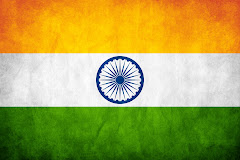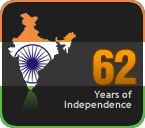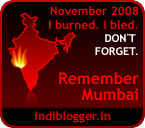New Delhi, 25th January, 2010
My fellow citizens,
On the eve of our 61st Republic Day, I extend my warmest greetings to all of you across the country and also to those living abroad. To the members of our Armed Forces and Para-military forces who guard our frontiers and to our internal security forces, I extend my special greetings.
26th January, this year marks the completion of six decades of working, striving and, all along, being guided by the principles and objectives of the Constitution that was framed after careful deliberations and adopted in 1950. I often recall the speech of Mahatma Gandhi at the launch of the Quit India Movement on 8th August, 1942, where he said that power, when it comes, will belong to the people of India. The wish of the Father of the Nation found expression in the very opening words of the Constitution - We, the people of India. This was a strong affirmation that the impulses of the nation and its future would be guided by its people. They would reflect their aspirations and choices, through democratic means. They would also enjoy the fundamental rights that guarantee their freedoms and dignity. Today, is a reminder that upholding the values, determining the direction and propelling the growth of our nation is a task that must be fulfilled by every citizen of the country.
In the first decade of the 21st century, India witnessed transformational changes. It also emerged as a force driving change in the world. Our achievements and experiences have, indeed, brought the nation to a definitional stage, where the promise of a bright future as a developed and progressive nation is for us to claim, as we all work together with conviction and commitment. However, as we overcome deficiencies and convert our strengths into an energetic force, we must remain deeply conscious of what we must preserve and what we must change.
Foremost amongst what we must continue with, is our democratic principles and way of life. We have ably demonstrated that we are a functioning democracy, by time and again, choosing our governments through the ballot and by taking democracy to the grassroots. Also, as we are aware, democracy is very much more demanding. It is the rule of law. It is the rule of reason. And, as India has shown to the world, it is the rule of non-violence. Democracy involves a pattern of behavior, in which every individual must act responsibly, show respect towards dissimilar opinions and address differences in a constructive and accommodative manner. This will build harmony and tolerance - values which are intrinsic to our philosophy; these form the bedrock of a society that embraces the diversity of language, religion and culture to create a composite whole. These values must be followed uninterruptedly in a nation that is, as vast and as varied as ours.
Secularism, our constitutionally chosen path, entails respect for all religions. Its place in our national life is unalterable. India is a land where followers of different religions have lived together for centuries. We must maintain social cohesion. Our tradition of living in accord with each other must continue to form an integral part of the rhythm of life of our future generations.
Belonging to a civilization that has deep reverence towards nature, we must also be sensitive inhabitants of the Planet, in which climate change has become a major challenge. We must judiciously use its resources, work to conserve its rich flora and fauna as well as adopt environment friendly approaches. Use of energy efficient technologies and renewable sources of energy, are some steps that can reduce the carbon footprint.
Dear Citizens,
Our nation has made significant strides. We are the fourth largest economy of the world in terms of purchasing power parity. Our target of achieving a double digit growth rate is plausible and realistic, given our impressive performance during the last decade and our resilience during the global economic downturn. We should continue with policies that promote growth, and also take growth patterns to the bottom of the pyramid and, to those currently outside its purview. Empowering the poor and the disadvantaged, enabling them to move up the economic ladder, to join the ranks of the prosperous, is a task that must be accomplished by all of us. Women need to be made full and equal partners. The inclusive growth strategy, which we have chosen, can make our growth process equitable and sustainable.
The roadmap to inclusive growth requires social justice that can be delivered through an effective social sector infrastructure. It should make quality education and good health facilities available to all citizens, along with social services and job opportunities. This, in turn, will create a human resource base which has the skills, knowledge and capacity to work productively. Hence, our attention must remain focused on this, especially as we have a young population. They must be nurtured and prepared for taking up their responsibilities. Future growth in all sectors will depend on knowledge workers and skilled workforces. They can make our economy dynamic, our service sector efficient and competitive, our manufacturing industries broad based and our agriculture and allied sectors strong. Furthermore, integrating and developing linkages between sectors, say agriculture and industry, will further reinforce growth. These linkages can be fortified by having connectivity at various levels. For a nation which is the seventh largest in geographical terms and the second largest in terms of population, our existing physical infrastructure is inadequate. This constrains and limits connectivity. We have to change this situation. The number of bridges, roads, harbours as well as our power generation capacity and transport facilities, among others, require extensive additions. But, do not forget that along with these structures of cement, steel and mortar, it is also important to bridge our differences, build roads to connect hearts and minds, harbour compassion, generate goodwill towards all and transport these feelings to strengthen the unity of the nation. We will also have to create an atmosphere for our citizens to exercise their rights and tell them to perform their duties as well. This is important to make the development of a democratic nation of over one billion people, participatory and sustainable. In the next decade, not only must we witness the speedy building up of infrastructure, but also a greater cohesiveness among citizens.
A bottleneck and an impediment in bringing about the desired results, for which policies and schemes have been formulated and huge allocation of funds made, is weak implementation and corruption in the system. The causes of the chronic ailment of tardy implementation have to be treated. There should be accountability for lack of implementation of projects, programmes and schemes. This is critical for bringing about positive change.
Public-Private Partnerships and SHGs, that is Self-Help Groups, are important mechanisms for outcome-oriented action and for creating a wide network of stakeholders for growth. There have been numerous examples of how women in urban and rural areas have been able to become financially self-reliant through the SHG route. A movement towards universalisation of SHGs, that brings within its ambit all eligible women, can be a powerful instrument for the economic empowerment of women and for inclusive growth. Facilitation of their formation and functioning will, thus, create a wave of progress and change.
Dear Citizens,
The world over, as also in our country, there is a rising demand for food-grains. This foretells the need for an intense focus on increasing agriculture productivity to ensure food availability, particularly of agricultural produces which are in short supply, to avoid spiraling food prices. To achieve this very important objective, I call for urgent steps towards a Second Green Revolution. There should be use of new technologies, better seeds, improved farming practices, effective water management techniques, as well as more intense frameworks for connecting the farmer with the scientific community, with lending institutions and with markets. Our farmers are ready and willing to work, earn and learn. We have to respond positively and do some "out of the box thinking". Higher agriculture incomes will improve the living standards of the over 145 million rural households, in the over six lakh villages of the country. With higher income levels, the rural economy will generate demand and provide impetus for growth in other sectors. Recognizing this reality, we have to involve the agriculture economy more pro-actively into the growth process, both as a centre of production and as a generator of demand for various products and services. There are many complementarities that exist between farming communities and the corporate world because both are private enterprises. The possibilities of win-win partnerships between industry and agriculture should be explored. For example, the food processing industry when located close to agricultural areas can transform India's rural landscape. Currently, food processing in India is as low as 10 percent of production, as compared to 65 percent to 80 percent, generally seen in the developed countries. Other agro-based industries would be equally important as propellers of growth. The question is how to attract farmers into such partnerships, which do not adversely affect, but rather keep the interests of farmers in the forefront and take into account their various sensitivities, particularly about their land-holdings. This needs to be done in a farmer-friendly manner and by creating awareness in the farming community. Some Indian companies have understood that linking farmers to industrial units would be beneficial to both. They have developed interesting models of engagement with the farming community. We should study these experiences, as we look at viable options that suit Indian conditions for harnessing the potential of village economies.
Dear Citizens,
Today, the optimum use of capital or labour or resources across the entire spectrum of our national activity is dependent on cutting-edge technologies and technological breakthroughs. We need technologies for more efficient and cleaner energy, for our industry and agriculture. India has to chalk out strategies that will promote research and development resulting in innovative methods and techniques. The quality of research in our country must be upgraded to build knowledge structures. I think the nation should take this up as an urgent calling. A knowledge economy requires an education system that encourages creativity and a capacity to think in a novel fashion. Also, our research institutions should join global knowledge networks to keep themselves abreast of worldwide advancements in research. Technology should reach a broader section of our society, and also the movement of grassroots innovations should receive encouragement.
A change which is required, and of which I have spoken often is the eradication of social malpractices in particular those related to discrimination against women. These pose a hindrance on our path to building a more progressive and equitable nation. We should follow a positive agenda for the empowerment of women. A change in our mindsets will be important to remove prejudices and create equal opportunities for all citizens. This is essential for our inclusive growth agenda and for tapping the full potential of our population.
In any mission, particularly one as complex and challenging as nation building, as has been said by our first Prime Minister Pandit Jawaharlal Nehru, "We have to labour, and to work, and to work hard, to give reality to our dreams." For this, motivational levels have to be kept high.
Media can have an important influence on how people see the country. With relentless advances in technology, media is now an integral part of our daily lives. It can create awareness by bringing information to the people, getting them to reflect, and making them realize their responsibilities towards the nation. With a media that plays a constructive role, people would be inspired to take actions that would contribute to building the nation and also to learn about the benefits of positive actions.
For growth, an environment of security is essential. Government is committed to maintain high vigil and take appropriate measures to address internal security challenges. Our country has been a target of terrorism for more than two decades. Government has taken and will continue to take necessary steps to tackle threats emanating from terrorism. It will also continue to work with the international community to combat this menace.
As in the past, in the future also, the voice of India in the world would be a voice for peace, a voice for development, and a voice of hope. In the global arena, we will seek a change in the structure of multilateral institutions, so that they reflect contemporary realities. We will continue to cooperate with the international community to deal with global issues. We will seek to build friendly relations with countries in our region and those across the world.
As 2009 came to a close, there have been many analyses about what are the possible prospects of the next decade for India. Some refer to it as the deciding decade, the decade of reckoning. On reflection, I fully agree that it will be so. It must, therefore, mean a decade in which all Indians must do their work with a sense of responsibility, discipline, integrity of mind and purpose as well as with a spirit of cooperation. We will have to inspire our young generation so that they are virtuous, with good character and a sense of fellow feeling towards others. We must channelise all our efforts towards the goal of taking the country to a higher level of all round national development and not rest till we achieve our goal. We can then be proud that we have performed our duty and borne our responsibility well. It is said that, fortune is an outcome of good work and can slip away, if we are lax in our work. I am reminded of a few inspirational lines:-

With these words, I once again wish all fellow citizens peace, prosperity and progress on the occasion of our Republic Day.
JAI HIND.


















